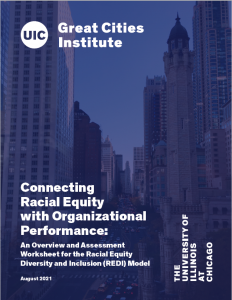UIC Great Cities Pilot | Operationalizing DEI
The Metropolitan Mayors Caucus and Illinois City/County Management Association have partnered with the UIC Great Cities Institute to provide support to municipalities interested in operationalizing diversity, equity, and inclusion in their municipalities.
About the Program:
This pilot was designed by municipalities, for municipalities. Over the past few years, the Metropolitan Mayors Caucus, ILCMA, and UIC Great Cities have worked closely with elected officials and municipal staff from across the Chicago region and state of Illinois to better understand the unique challenges faced by small- to mid-sized municipalities interested in pursuing this work. Members of the MMC DEI Working Group and ILCMA Diversity and Inclusion Committee played an active role in advising the creation of this pilot. Read more about the program partners below:

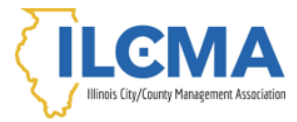


The Metropolitan Mayors Caucus
The Metropolitan Mayors Caucus is a membership organization of 275 municipalities surrounding the City of Chicago. The Caucus convenes elected officials and municipal staff from across the region to collaborate on shared policy issues. In 2021, the Caucus’ Diversity Issues Task Force formed a monthly DEI working group to allow local elected officials and practitioners to engage in facilitated dialogue around specific topics of interest. The topics identified by the working group have formed the foundation of the curriculum for this pilot program.
Illinois City/County Management Association (ILCMA)
The Illinois City/County Management Association is a professional association of city, village, and county managers / administrators across the state of Illinois. ILCMA strengthens local government management in Illinois by fostering the personal and professional development of its members. In 2021, ILCMA established a standing Diversity and Inclusion Committee to educate members on DEI through training opportunities, build relationships with affinity groups established in the work of DEI, and develop tools, programs, and techniques to help member organizations reach their DEI goals.
University of Illinois Chicago Great Cities Institute
The University of Illinois Chicago Great Cities Institute is a research hub that explores how cities and regions make themselves into great regions. Dr. Kathleen Yang-Clayton, research fellow at the Great Cities Institute, Clinical Associate Professor of Public Administration, and Associate Dean for Diversity, Equity, and Inclusion in the College of Urban Planning and Public Affairs, is the subject-matter expert on the integration of public administration and racial equity to increase trust in government and improve government performance. Her previous experience with municipalities includes the 2020 Census Complete the Count effort and REDI initiatives at the City of Evanston and Forest Preserves of Cook County.
Chicago Community Trust
The Chicago Community Trust is the Chicago region’s community foundation. Through its Advocating for Policy Change initiatives, the Trust supports organizations engaged in public sector leadership development, strengthening the public policy landscape, and advancing systems change. The Metropolitan Mayors Caucus received funding from the Chicago Community Trust in October 2021 to advance it’s DEI work. This funding partially supports the development of this pilot.
Program Design & Structure:
This 6-month pilot will provide ongoing training, coaching, and peer support to a cohort of 10 municipalities. Each month (or cycle) of the pilot will involve one in-person training session held at the Northern Illinois University Naperville campus. Trainings will be held from 8am-12pm on the dates specified below. The monthly in-person trainings are followed by two weeks of independent work on a project unique to each participating community. The final week of the cycle involves a small-group coaching session with an experienced coach. Participants will be expected to attend all sessions.
Learning Outcomes:
Participants will learn the principles of racial equity driven organizational change and how to apply disciplined, practical approaches to incorporate equity into management and leadership decision-making processes unique to their community. The program curriculum will focus on internal organizational practices including performance management, internal communications, human resources, and finance. These focus areas are elaborated below:
-
- Performance Management
- Establishing systems to collect relevant DEI data
- Identifying analytic tools and metrics to track and measure DEI progress, outcomes, and impact across different departments
- Establishing accountability mechanisms to increase and sustain DEI outcomes
- Conducting an audit of policies, procedures, and practices
- Conducting an audit of social service gaps within the organization and more broadly in the community
- Assessing customer service practices within the organization for their impact on community equity and access
- Internal Communications
- Developing functional interdepartmental working groups focused on DEI
- Conducting an internal staff survey and staff focus groups to assess internal organizational culture
- Facilitation practices for productive community engagement
- Human Resources
- Analyzing staff demographic data, retention, and promotion statistics
- Reviewing hiring and recruitment practices
- Financial Management
- Incorporating participatory budgeting into annual budgeting process
- Assessing procurement and purchasing practices
- Performance Management
Participant Eligibility:
Municipal governments from across the state of Illinois are eligible to apply. Organizations interested in applying must designate two senior-level staff persons from separate departments within the municipality or separate government entities in the community (such as a representative from the municipality + school district, library, township, etc.). If a municipality would like to elect two senior-level individuals from the same department, these individuals should be able to demonstrate that they are committed to an organization-wide or community-wide participation in the pilot. Participants should have decision-making authority and influence within their organization, such as department heads or managers.
Cost:
This pilot will be FREE to participating organizations.
How to Apply:
Please complete the following application form by Friday, June 24, 2022: https://uic.ca1.qualtrics.com/jfe/form/SV_5aNvCczRicQVoZ8
Application questions may be previewed in pdf form here. However, all applications must be submitted via online form.
To learn more about this program, please contact Katie Friedman, kfriedman@mayorscaucus.org.
Resources:
- Operationalizing DEI Pilot Program Overview – PDF
- This pdf contains all of the information provided on this page about the program.
- Operationalizing DEI Pilot Program Applicaiton – PDF
- This is a pdf of application questions that may be used as a reference point for organizations interested in applying. Please note that all applications must be submitted via online form in order to be considered. The application can be found in the ‘How to Apply’ section and at this link.
- Pilot Overview – Presentation Slides from UIC Great Cities
- These slides were presented by Dr. Kathleen Yang-Clayton at the May 10, 2022 Diversity Issues Task Force Meeting and provide information about the design and intention of the pilot.
- Pilot Overview – Presentation Recording from 5/10/22 Diversity Issues Task Force Meeting
- This is a meeting recording from the May 10, 2022 Diversity Issues Task Force Meeting. See 00:26:50 – 00:40:00 for a presentation by Dr. Kathleen Yang-Clayton describing the design and intention of the pilot.
About GCI’s Approach to REDI
REDI stands for Racial Equity Diversity and Inclusion (REDI). We intentionally use the term race to acknowledge and honor the root cause of public policy and administrative failings stem from a legacy of legislative and administrative codes that have been used to systematically oppress, marginalize and exclude those who were enslaved, indigenous people, women, those with disabilities, and LGBTQ+ individuals.
GCI works with cities and organizations across the Chicagoland area to create Racial Equity Diversity and Inclusion (REDI) committees.
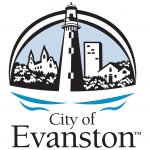
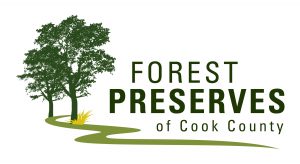
Recent Related Projects:
Growing Racial Equity in the Forest Preserves of Cook County
Formed in November 2018 and comprised of employees from across the organization, the REDI Committee focuses on restructuring internal processes to reflect our values of equity and inclusion, while educating Forest Preserves employees on how to practice racial equity in the workplace.

Photo Credit: Jerry Attere
Despite the ongoing challenges posed by the COVID-19 pandemic in 2021, the committee continued to work on existing initiatives, created new opportunities to enhance cultural competency among Forest Preserves’ staff, and promoted racial equity, diversity, and inclusion to visitors, employees, partners, volunteers, and vendors.
REDI Accomplishments include:
✓ All job interviews incorporate a REDI interview question
✓ Job descriptions state a preference for language skillsets and Conservation Corps experience
✓ Staff evaluations include a REDI category as pass/fail
✓ Interview Compliance training covers a REDI overview
✓ All interviews consist of a diverse interview panel including interviewers from different departments
✓ Racial equity scenarios incorporated into EEO training
✓ Updated the Non-Discrimination and Harassment Policy to increase understanding and clarify how to seek assistance.
External improvements to make the Forest Preserves more inviting include:
✓ Updating the land acknowledgment statement and website information on how we are using it as a tool to improve relations with local Native American communities.
✓ Improving the Forest Preserves’ Accessibility website makes it easier to find accessibility amenities and information for each site.
✓ Adding the option for gender pronouns on the Forest Preserves’ standard email signature (to promote a more diverse and inclusive environment) and an option to include the Land Acknowledgement (to acknowledge that the Forest Preserves are on Native American land).
See the Full Report here: Growing Racial Equity
Racial Equity in Action: Year 1 of the City of Evanston REDI Committee 2021 Annual Report
The Racial Equity Diversity and Inclusion Committee (REDI) was created as an organizational response to ongoing concerns and needs of city employees to operationalize one of the city council goals of “Ensuring Equity in All-City Operations.”

REDI members at the Lorraine H. Morton Civic Center (Pictured left to right: Lukasz Tatara, Dr. Kathleen Yang-Clayton, Jessica Hyink, Darrell King, Michael van Dorpe, Indira Perkins, Meagan Jones, Kate Lewis-Lakin, Jessica Wingader, Tasheik Kerr, Kimberly Richardson, Austin Zamudio)
REDI Committee members created pilot projects as the vehicles through which they proposed sustainable institutional change. Members used their expertise as staff from departments across the
City to develop comprehensive solutions to issues that negatively impact day-to-day operations. In 2022, pilot project teams will begin to implement and concretely bring their pilot projects to fruition. New committee members will also be brought on board to add their capacity to existing projects and suggest their own.
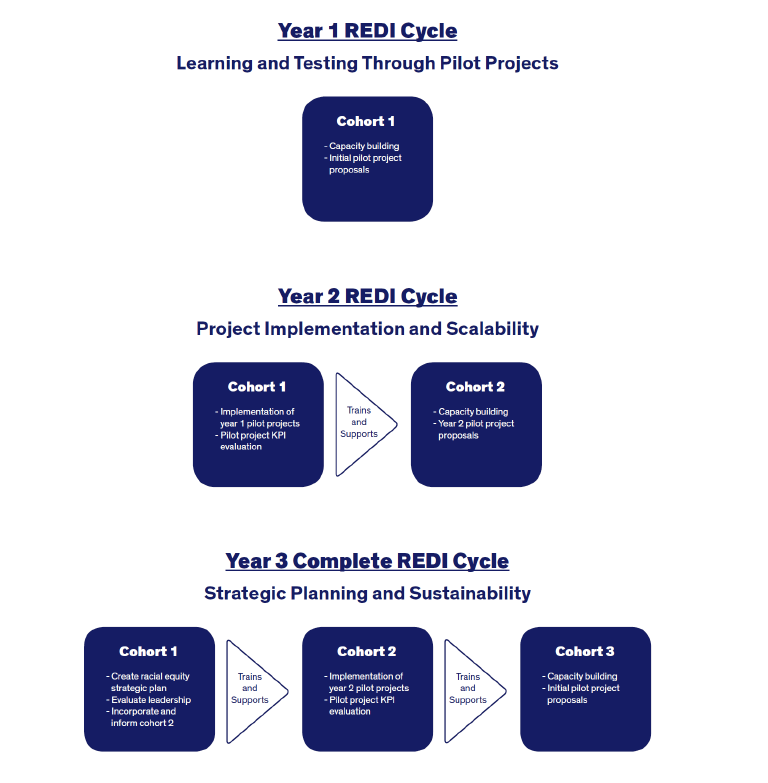
See the Full Report here: Racial Equity in Action
Making It Count: Documenting and Building on the Civic Infrastructure of the Illinois 2020 Census Program
In promoting the 2020 Census count, Illinois was faced with the difficulties of reaching a wide range of communities, including urban, suburban and rural areas with extremely different levels of income, many different types of housing, varying citizenship statuses, multiple home languages, and a wide range of other social and economic characteristics. Achieving a successful Census of the state’s 4.8 million households was a substantial undertaking requiring mobilization of stakeholders across the state. Thanks to the combined efforts of state and municipal governments, nonprofit organizations and philanthropies across Illinois, as well as an unprecedented state investment in public outreach, Illinois’s 2020 response surpassed its 2010 response. Importantly, while the state’s average self-response rates consistently ranked among the highest in the nation, there were major disparities across the state.
The 2020 Illinois Census Project was a statewide outreach effort to prioritize the hardest-to-count Illinoisans in Census numbers. As an innovative strategy, the state implemented a networked governance model, colloquially referred to as the “hub and spoke” model, which focused on convening partners called Regional Intermediaries (RIs) anchoring regions across the state that, in turn, supported networks of Subrecipients (SRs) with deep roots within many local communities. The state’s efforts focused on building the capacity of these convening partners, coordinating outreach endeavors throughout the state, building the capacity of those on the ground to do direct outreach, and coordinating with other local government efforts such as Cook County and the City of Chicago. The effort intentionally focused resources on strategies that would deliver the best return on investment to improve the response rate to the Census questionnaire.
Whether it is messaging on fundamental civic practices such as filling out a Census form or urgent public health education on COVID-19 vaccine implementation, the immediate lessons learned from the Illinois 2020 Census Project are relevant and actionable today. With respect to constructing a comprehensive and effective outreach effort for the 2030 Census, this report presents feedback and practices that strongly encourage continued investment in the collaborations created for census outreach. Incremental investments in this network, strengthening some of the self-identified capacity gaps, and intentionally incorporating partners in strategic planning and implementation that includes strengthening the public’s trust in government is as urgent today as it will be in 10 years for the 2030 Census.
See the Full Report here: Making it Count
About the Team
 Dr. Kathleen Yang-Clayton
Dr. Kathleen Yang-Clayton
Dr. Yang-Clayton joined the faculty in the Department of Public Administration, College of Urban Planning and Public Affairs at the University of Illinois-Chicago in 2017 after extensive experience in legislative advocacy and voter education, engagement and mobilization. Prior to joining UIC, she led voting rights and voter mobilization work for Asian Americans Advancing Justice – Chicago where she helped to pass landmark legislation expanding voting rights and strengthening election systems in Illinois. She is a Research Fellow at the Great Cities Institute and a member of several national initiatives that integrate public administration and racial equity together from the Kettering Foundation, National League of Cities and the International City/County Management Association. Her current work focuses on the operationalization of racial equity practices inside of large public organizations that increase the public’s trust in government and improves government performance, especially but not exclusively in historically marginalized communities. She was appointed associate dean for diversity, equity and inclusion at her college in 2021.
Recent Work from Dr. Yang-Clayton
“Addressing COVID-19: Fostering Equity In and Out of the Classroom” Webinar, Co-Sponsored by the American Society for Public Administration and NASPAA. June 4, 2020.
“Dismantling White Supremacy in Public Service Organizations and Society.” Webinar, American Society for Public Administration. June 17, 2020
“Racial Equity From Agency wide Initiatives to Social Service Programs.” Webinar, University of Illinois Extension Local Government Education Series. July 16, 2020.
 Adam Slade, MPPA, M.Ed.
Adam Slade, MPPA, M.Ed.
Adam Slade is a Visiting Research Specialist at the Great Cities Institute (GCI) at University of Illinois Chicago. Adam engages in public administration research on racial equity policy and process improvement, organization change transformation, education policy, government budgeting and finance.
Previously, Adam worked for the Metropolitan Planning Council focusing on technical assistance to many local units of government around municipal capacity building in the Northeastern Illinois region and advocating for effective government policies. Prior to that Adam was a Senior Consultant at the Government Finance Officers Association, working with city, county, and state government organizations guiding financial process analysis, delivering training and conducting research. He also has consulting experience implementing technology solutions for local governments, was an elementary school teacher, and worked as an appeals analyst working on property tax valuation and policy for The Board of Review of Cook County.
Adam is currently pursuing a PhD in the Department of Public Administration, College of Urban Planning and Public Affairs at the University of Illinois Chicago. He holds a Master in Public Policy and Administration from Northwestern University and a Master of Education from Lesley University.

